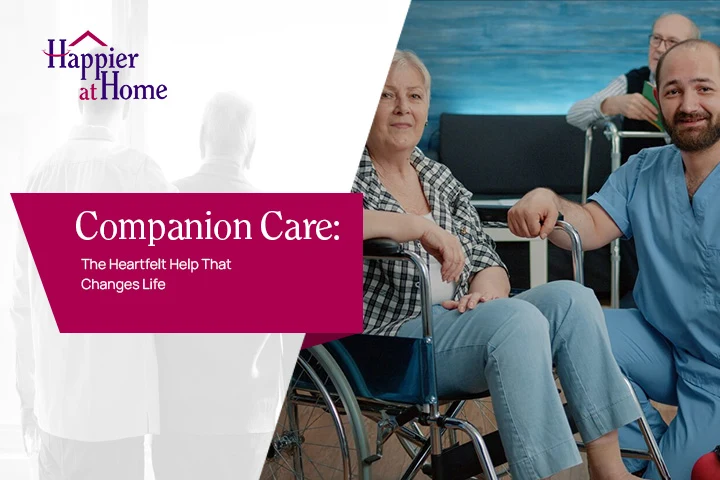The world is moving at a fast pace, and our elderly population is growing even faster. According to the United States Census Bureau, 61.2 million people are above the age of 65 (as of 2025). This also means there’s an increasing need for services to care for our seniors and provide peace of mind for millennials worried about their parents.
Many people assume home care is medical. That is not the case! There are all types of services available, which are particularly helpful when adult children live away from their parents.
Companion care, for example, is perfect for many aging adults to want to stay independent but do not need all that comes with higher levels of care.
Happier at Home is your guide to navigating what services make sense for you and your family.
What is Companion Care?
Companion care is a non-medical caregiving service for seniors requiring assistance doing daily activities. Companions may be hired to assist elderly individuals who are lonely, recovering from an illness, suffering from a disability, and need the connection to remain healthy.
Such services may include, but are not limited to:
- Meal preparation and planning
- Light housekeeping and laundry
- Hygiene and dressing assistance
- Shopping and errand transportation
- Exercise assistance
- Overnight visits are also available
- Transportation to and from appointments
- Care advocacy
- Medication reminders
- Fall risk mitigation/assistance
- Conversation and stimulation (puzzles, cards, etc.)
Who Benefits from Companionship Programs?
Companion care can be valuable for anyone, but especially helpful for:
Lonely Seniors
Seniors in retirement can feel isolated. Their adult children may live far away, and so they lack the stimulation needed to remain healthy. This is particularly true after a spouse passes away, for example.
Individuals With Disabilities
Individuals with disabilities often face trouble performing daily duties. However, with companion care, seniors can stay social and connected, which is excellent for mental health.
Recovery Or Post-Surgery Patients
If you have a parent recovering from an illness or surgery, companion care services help provide the perfect companion in their recovery journey. This may be temporary or long-term, and keeps patients from relapsing or graduating to high levels of care (which can be expensive)!
Family Caregivers
Are you caring for an elderly parent and still working? You need relief, too! This is a great way to not only help your parents but also help yourself (so you can be at your best). Happier at Home can discuss how we can fill those gaps. Minus the guilt!
What Makes A Great Companion Caregiver?
These caregivers are more than just helpers. They’re helpers who form true relationships with their clients. We always say that we’re in the business of empathy!
We provide top-notch training for all our caregivers.
Excellent Communication Skills
An exceptional caregiver is a good listener and an excellent communicator. Their active listening skills help seniors stay active and social while performing daily activities.
Patience
Patience is the key, as often, clarity and repetition help our seniors stay focused and engaged. While their bodies slow, their minds don’t always have to!
Reliability
Trust and comfort with a reliable companion help create a stable routine for seniors.
Empathy
A caregiver must be empathetic to understand the emotional needs of the seniors.
A Sense of Humor
Laughter is the best medicine when it comes to recovery from illness and isolation. So a little bit of humor goes a long way.
Final Words
Change can be difficult and even scary. One of the biggest changes a person will experience is the loss of independence (while not losing their dignity).
Happier at Home works to find the perfect caregivers to engage our clients to create impact and improve quality of life through empathy truly. So, if you’re looking for the right companion for your aging loved ones, Happier at Home might be the perfect choice for you.


